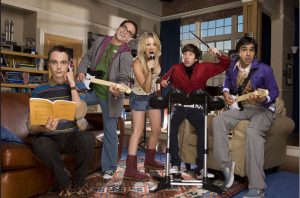In defense of The Big Bang Theory
The Big Bang Theory is one of those Marmite shows that people seem to either love or hate. Some say it’s forward-thinking, unique and utterly hilarious. Others say it’s backward, sterile and horrendously unfunny.
I’m of the opinion that it’s perfectly OK to like something you can see is very flawed. But I don’t think many of the criticisms levelled against The Big Bang Theory are fair, or at least don’t accurately pinpoint issues in the show. Rather than correct my tragically mistaken fellow students one by one, I thought I’d address all the complaints against The Big Bang Theory in one cohesive article to be perused at leisure. So here are some of the most common criticisms hurled at the show, along with my counter-arguments as to why, although flawed, the show is still pretty damned fun to watch.
A common complaint about the show is the sexist writing, particularly the characterisation of Penny as a flighty blonde cliche to be ogled by cast and audience alike. And well…yeah. There’s more than a grain of truth to that. But, just as the characters started as a selection of tired stereotypes who couldn’t get laid but grew into more well-rounded and believable people, the show matured with them, and it ultimately grew past its problematic premise.
Crucially, The Big Bang Theory stresses that its central tenet of “pretty girls don’t go out with nerdy boys”is the jaded belief of its damaged central cast, not a law of nature. The four men all ending up in steady relationships isn’t treated as a fluke or miracle; each character overcomes significant personal flaws in order to become the kind of person who could sustain a long-term romance, including sexual aggression, shyness and fear of rejection.
The series has since developed a much more gender-balanced cast, and whilst the show has been criticised for its misogynistic portrayal of women, the show has much broader and less restrictive parameters for masculinity than most TV right now. Raj in particular is allowed to be both straight and camp while, although teased for his effeminacy, nobody ever suggests his tastes are inappropriate because he’s a man. The writers never felt the need to give him one hyper-masculine trait to counterbalance his feminine proclivities, and it never interfered with his bromance with Howard.Additionally, Sheldon remains one of the few asexual characters ever to appear on mainstream television and his preferences are rarely played for laughs.
I would have more respect for the show if it allowed Sheldon to remain celibate instead of altering his preferences over time, but I’m grateful that not all the characters look like supermodels and that many of them suffer from realistic unsexy problems, such as anxiety and loneliness.
The writers clearly take pains to make the science as authentic as possible, and the interests and conversations of the main characters reflect real developments in the global scientific community. However, a lot of people seem to find the use of science facile, and think the characters are an inaccurate representation of nerds, particularly of physicists. Another big complaint is that it perpetuates the myth that smart people have no social skills.
I don’t think it’s fair to burden the show with the responsibility of representing all scientists everywhere, but conversely I’ve heard people say they’ve been told that if they just don’t like the show it’s because they’re “just not smart enough”and don’t “get the jokes”. Personally I don’t think that’s a very smart thing to say, but it highlights an interesting dichotomy among viewers, who identify with the high value put on intelligence in the programme and feel threatened when that insider’s community is made available to a mass audience, or when they feel it’s misrepresented.
I’ve also heard people say the nerd humour is “not proper nerd humour”because it tries to to be inclusive of an audience that don’t have the same reference pool as the characters. For example, a ‘true’nerd might say “it’s cold as Hoth”, whereas a Big Bang Theory character might say “It’s as cold as the ice-planet Hoth from Star Wars”. But in my opinion there’s nothing wrong with inclusivity, especially when dealing with a subculture which is famous for its inhospitality towards the uninitiated.
It’s commonly attacked for being one of the only comedies left on television to employ a laugh track, but The Big Bang Theory is actually filmed in front of a live studio audience. I understand why people might not like the humour, personally I think a lot of the characters are limited to three or four jokes and if you don’t like those jokes then maybe the series isn’t for you, but that never hurt other comedies like Little Britain or Royle Family. A lot of the humour actually comes from anticipating the pay-off of a particular set-up, once you know the formula, rather than surprise, and knowing that makes the show far easier to enjoy.
In an early interview, Simon Helberg, the actor who plays Howard Wolowitz, said of his character “I thought they were gonna kill him off or something”because of his one-dimensional persona. In early seasons, Howard was the stock cookie-cutter sex-obsessed side character seen in every comedy aimed at guys in the last twenty years. As of season eight he is a happily married retired astronaut who is currently working towards a PhD. He’s not the only one who’s changed. Raj has successfully overcome his social phobia and has a steady relationship. I can’t get behind the idea that the characters don’t develop. The series contains some beautiful examples of dynamic character arcs, and completely avoids the sin of the situational reset button that riddled so many sitcoms in the nineties and noughties. When things change in The Big Bang Theory, they stay changed, and usually for the better.


Comments (2)